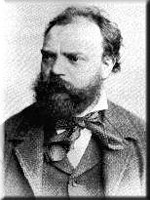|
Antonin
Dvorák
(Sept. 8, 1841 - May
1, 1904)
|
 Born in a Bohemian village about fifty
miles north of Prague, Dvorák was the son
of the local butcher and innkeeper. He learned
to play the violin as a small boy and was a
chorister in the local church. When he reached
the age of twelve he was sent to the
neighboring village of Zlonice to learn German
and to study piano, viola, organ and harmony
under Antonin Liehmann. Born in a Bohemian village about fifty
miles north of Prague, Dvorák was the son
of the local butcher and innkeeper. He learned
to play the violin as a small boy and was a
chorister in the local church. When he reached
the age of twelve he was sent to the
neighboring village of Zlonice to learn German
and to study piano, viola, organ and harmony
under Antonin Liehmann.
In 1857, when he was only sixteen, Dvorák
went to Prague to study at the organ school
there. While there he succumbed to the magic of
Wagner and Smetana. He spent most the the
1860's as an orchestral player, first in a
small band and then in the Czech National Opera
Orchestra, conducted by Bedrich Smetana. All
during this time he composed furiously but did
not publish any of it. In fact, he burned most
of it.
It was only in the early 1870's that
recognition started to come to Dvorák. In
1873 he left the Opera Orchestra to become the
organist at a Prague church in order to have
more time to devote to composition. He married
and, as he settled into his new life, his
creative activity burst forth. Recognition of
his genius began at long last to spread.
The tide had turned. He received the Austrian
State Prize for his music four years in a row,
partly because of advocacy from Johannes
Brahms. Contracts with publishers and
performances of his music in Berlin, Vienna,
and London soon followed. A star was born! The
rest is happy history. His
fame spread rapidly throughout the musical
world, and for a decade and more he enjoyed the
fruits of his labour.
Honors were heaped upon him. In 1891 he was
appointed professor of composition at the
Prague Conservatory. A year later he accepted a
position to head the New York National
Conservatory of Music in the U.S. After three
years in that capacity he decided to return
home in 1895. Restored to a more congenial
environment, he set to work on a number of
symphonic poems. His closing years were devoted
largely to creating operas, none of which were
anywhere near as successful as his orchestral
and chamber works. In 1901 he was made director
of the Prague Conservatory, where he continued
to teach until his death.
Dvorák's importance lies partly in his
nationalist outlook. During the last half of
the nineteenth century, Bohemia (later part of
the Czech Republic) fought for its political
and cultural independence from Germany. Like
Smetana and Janácek, Dvorák
consciously looked to Bohemian folklore for
artistic inspiration, imitating traditional
melodies, as in the Slavonic Dances, or using
traditional legends, as in his best-known
opera, Rusalka, composed in 1900. He had a
great gift for absorbing folk styles and
reproducing them in the context of the
classical tradition.
Biography by: Honey Fox
Submitted On : 08.25.00
|
|